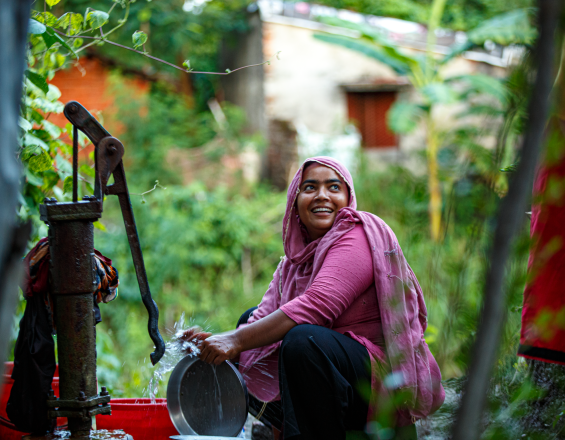
Laboratoires urbains pour des services de gestion de l'environnement urbain (UEMS) inclusifs

Les services de gestion de l'environnement urbain (SGEU) comprennent la gestion des déchets solides, des espaces verts (parcs, espaces ouverts, terrains de jeux) et des espaces bleus (étangs, canaux, rivières) dans les villes. Ils sont essentiels à l'adaptation des zones urbaines au changement climatique, à la protection de l'environnement et au maintien de la santé et des moyens de subsistance des habitants.
Le concept de laboratoire urbain offre des solutions efficaces au lien entre les espaces verts et bleus et la gestion des déchets solides. Il vise à rassembler un groupe diversifié de la société civile locale, des acteurs du secteur privé et des décideurs politiques pour développer et tester des mesures intégrées (par exemple, pour la gestion institutionnelle, les concepts techniques intégrés, les technologies adaptées) pour des systèmes de gestion des déchets solides inclusifs. Cette approche contribue à rendre les SEUM durables et bien adaptés aux besoins d'une zone urbaine spécifique et à sensibiliser à l'importance de la protection de l'environnement dans cette zone. elle favorise également la coopération au niveau des ménages.
Impacts
Les espaces verts et bleus bien gérés et propres recèlent un potentiel d'adaptation des villes aux impacts du changement climatique.
La santé physique et mentale des populations urbaines peut également en bénéficier. Les espaces ouverts et verts favorisent un mode de vie plus actif et un sentiment de bien-être qui, à son tour, peut faire baisser la tension artérielle et les niveaux de cortisol, ainsi que réduire le risque de diabète de type 2 et d'accouchement prématuré. En outre, une meilleure gestion des déchets réduit le risque de parasites (rongeurs) et, par conséquent, la transmission d'agents pathogènes.
L'implication du secteur privé peut générer des idées commerciales nouvelles et innovantes, des partenariats public-privé et des possibilités de génération de revenus pour les groupes de population pauvres. L'amélioration de la situation environnementale et le renforcement de la capacité d'adaptation des villes réduiront les pertes économiques causées par les effets du changement climatique ainsi que la probabilité que les cycles économiques soient perturbés par des catastrophes environnementales.
Étant donné que les laboratoires urbains constituent une approche participative, ils requièrent le dialogue et la collaboration de différents groupes de population. Ils peuvent donc construire et renforcer les communautés locales.

